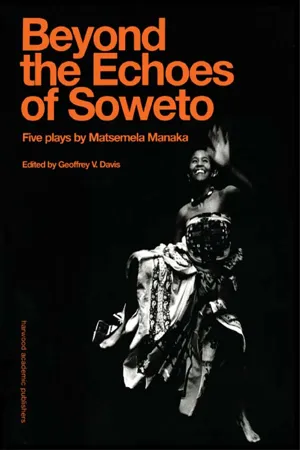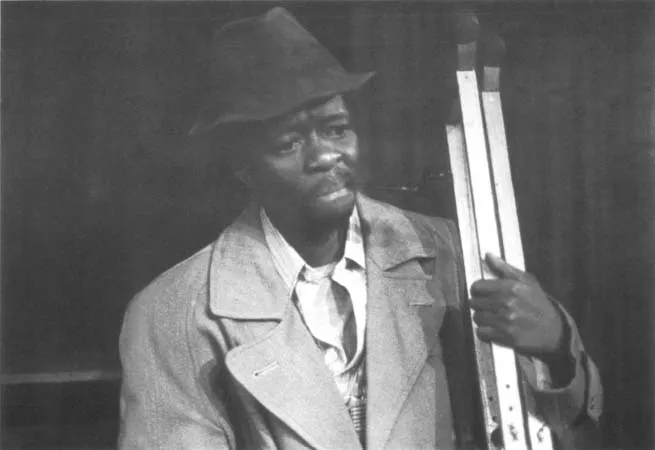![]()
CHILDREN OF ASAZI
4. Children of Asazi. Peter Boroko as Nduna. © Sols Photosdoc 1986
CHARACTERS
DILIZA – a young activist who is about twenty years old
CHARMAINE – a young apolitical girl who is about twenty years old
NDUNA – an old jazz guitarist who is in his late fifties
GOGO – a disguised woman who is about fifty years old
MAJIKA – an older politician who is about fifty years old
MABU – a jazz saxophonist who is about forty-five years old
OFFICER – an old man in his early forties
Diliza means “demolish” in Zulu.
Nduna means “headman”
Gogo means “old lady”
Majika means “chameleon”
Mabu means “child of the soil”
CAST
The cast of the 1986 production was as follows:
| Diliza | Ali Hlongwane |
| Charmaine | Soentjie Thapeli |
| Nduna | Peter Boroko |
| Gogo | Thelma Pooe |
| Majika | Job Kubatsi |
| Mabu | Khaya Mahlangu |
| Officer | Peter Boroko |
| Blind Woman | Soentjie Thapeli |
CHILDREN OF ASAZI
PROLOGUE
(The stage resembles a proclaimed slum in Johannesburg, Alexandra Township.1 It is a windy night. There are five corrugated irons with windows and candle light burning behind each corrugated sheet of iron. We hear people singing.)
| SONG: | Alexandra Khayalami |
| | Alexandra Khayalami |
| | Alexandra Khayalami |
| | Alexandra Khayalami |
| | You may be a dark city |
| | but you are a home |
| | the candle blows |
| | the night away |
| | like in all shelters |
| | Alexandra Khayalami |
| | You may be a dark city |
| | but you are a home |
| | the candle blows |
| | the night away |
| | like in all shelters |
| | Alexandra Khayalami |
| | Alexandra Khayalami |
| | Alexandra Khayalami |
| | Alexandra Khayalami |
| | Alexandra Khayalami |
(The wind blows stronger. Blows off the candle lights. Rain falls. Lightning strikes. They continue to hum the song. The morning breaks. They stop singing. We hear the sound of a bulldozer; a demolition is in progress. We hear angry voices. Some people are moving about. They throw their belongings out of their homes. Others peep through the windows and sing.)
| SONG: | Kwenzenjani na! | [What could have gone wrong |
| | Masiduduka | When we run helter skelter |
| | Sigoduka | Going away |
| | Ezwenilethu | From the land of our birth]. |
| | Kwenzenjani na! | |
| | Kwenzenjani na! | |
| | Masiduduka | |
| | Sigoduka | |
| | Ezwenilethu | |
| | Thina siyajikeleza | [We run in circles |
| | Ho! kulelizwe | In this land |
| | Ho! siduduka | Running helter skelter |
| | Ho! sigoduka | Going away]. |
| | Thina siyajikeleza | |
| | Ho! kulelizwe | |
| | Ho! siduduka | |
| | Ho! sigoduka | |
| | Thina siyajikeleza | |
| | Ho! kulelizwe | |
| | Ho! siduduka | |
| | Ho! sigoduka | |
| | Kwenzenjani na! | |
| | Masiduduka | |
| | Sigoduka | |
| | Ezwenileth | |
| | Thina siyajikeleza | |
| | Ho! kulelizwe | |
| | Ho! siduduka | |
| | Ho! sigoduka | |
(Then the choreographed movement with corrugated irons. It is resistance. The sound of the bulldozer fades. People reassemble their belongings. They sing a song of resistance.)
| SONG: | Sothutha siyephina! | [Where will we go |
| | Kulomhlaba wobawo’mkhulu | In this, the land |
| | Sothutha siyephina! | of our forefathers]. |
| | Kulomhlaba wobawo’mkhulu | |
| | Sothutha siyephina! | |
| | Kulomhlaba wobawo’mkhulu | |
| | Masithethe ngazwinye | [Let us speak as one and say |
| | Sithi! | We shall not move |
| | Asihambi | Here we will die |
| | Sizofelala | We shall not move |
| | Asihambi | Here we will die]. |
| | Siyofelala | |
(It is resistance. The sound of the bulldozer fades off. It’s a choreographed movement of people reassembling their belongings, they arrange props [the chair, table, lamp, Diliza’s bag, jersey and writing material.] Exit the choreography. There is a spot on Charmaine reading a letter and then Diliza also reading a letter.)
CHARMAINE: Dear Father,
Many thanks for your letter. Only silence can keep us apart. Exile is not as far away as the distance of silence. Your letter came at the time when I was begining to feel very lonely. An intimate friend of mine, Diliza, who like you is one of those people who still believe they can change the world. And now I am afraid that exile may snatch him away from me like it did to you.
Baba, I hope you received my last letter. Since the disappearance of mama, strange stories come to me through uncle Gabashiane. Is it true that my mother died on the run from Sharpeville? And if that is the case, who is the woman who has been more than a mother to me?
Baba, today I am a woman. I would like to be able to tell my children about my history. Could you please tell me the truth before it is too late.
Your daughter
Charmaine
DILIZA: Dear Mother,
After all these years of an endless search, I began thinking of asking for your address in heaven. I thought you were no longer with us. Your mysterious letter gave me hope to continue the search. Wherever you are, know that your house is no more. Only memories are there. The bulldozer is striking real blows. I am writing this letter from the streets.
Mama, whenever, I see children in the streets, sniffing glue and drinking methylated spirits, I think of myself an...

